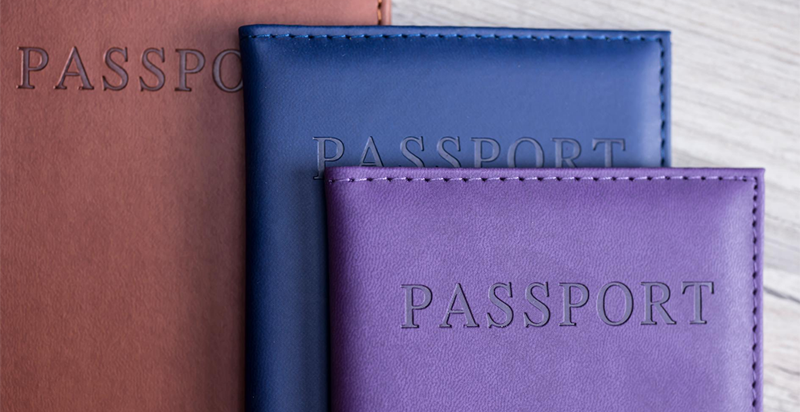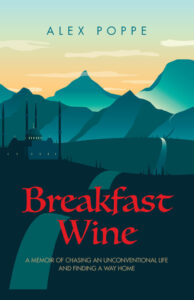
Expat, Economic Migrant or Refugee? And Why These Labels Shouldn’t Matter
Alex Poppe Considers Her Family’s History of Immigration In Light of Trump’s Xenophobic Assault
How many of us might not exist if our parents or grandparents had been denied entry into the US?
My dad grew up in Berlin during World War II. When he was eight years old, my grandmother sent him to live on a farm to keep him safe from Allied bombing. He remembered running through a field towards the farmhouse where he slept as Allied forces strafed the field. Was he crying? In my mind’s eye, I see skinny legs pistoning beneath a canopy of trees, planes thundering above.
As Allied bombing campaigns intensified, my grandmother worried the railroad tracks would be obliterated, so she brought my dad back to Berlin. Once, when my dad and grandmother were hiding in an air raid shelter, a few Russian soldiers came in, sat in the middle of the room, and started cleaning their rifles. “They would aim the weapon at one of us, but not fire it. They seemed to have fun with it. I thought for sure I was going to die that day.” My father was 12 years old.
I wonder what Dad and Oma would face if they were seeking safety in the United States today.
With support from the International Refugee Organization (IRO), a precursor to today’s United Nations High Commissioner for Refugees (UNHCR), my father and grandmother emigrated to the United States aboard the General Henry Taylor, serving as part of the U.S. Army Transport Service. I asked my father where he and Oma [the German word for grandmother] had found the courage to leave Berlin. “Oma lost all her family in the concentration camps, and the government drafted her husband for a cause he didn’t believe in, and he was killed,” Dad responded, looking at a photo of a snow-covered field dotted with wooden crosses. An army chaplain had sent the photo to Oma after her husband had been killed in combat. “My father had been sent to the Eastern Front, and these pictures are supposedly of his grave in Krassnaja-Gorka, Russia. It’s probably a cornfield today.”
What ties us to a place? What unties us? Behind closed eyes, I see my father sitting on the foyer floor of our modest, suburban Chicago home. Dad is cleaning and polishing his dress shoes for the work week ahead as I stand by the front door, watching him. He is tall, and I am small, but when he sits on the floor, we are almost the same height. He works fastidiously, using first a brush and then a soft cloth, which live together in a wooden box with a foot rest handle.
Dad’s work ethic—take pride in your work, whether you’re sweeping a floor or running a corporation, because having a job is a privilege—has accompanied me to Poland, Turkey, Ukraine, the West Bank, Germany, Panama, and northern Iraq, where I worked as an educator and volunteered in the humanitarian aid sector. When I am abroad, I am labeled an expat—not an economic migrant, although I have often sought employment abroad to gain economic advantage—and am often granted a status equal to or higher than my local peers because I am American.
Although I am usually paid more than my local colleagues performing the same role, the schools that employ me send a contact person to meet me at the airport and take me to an apartment the school provides. That contact person brings my suitcases into the apartment and does a quick insect/roach/rodent check at my request. The apartment is furnished. The utilities are already connected. There are sheets and towels and functional appliances. More often than not there is bottled water and basic food staples in the fridge. School staff arrange my work and residency visas, sometimes providing the green grease needed to make the process quick and easy.
The General Henry Taylor sailed into the New York Harbor, where Dad and Oma were met by an affiliate of the IRO, who arranged a place for them to sleep and then brought them to Penn Station the next morning. They caught a train to Chicago and were on their own. When they went to the Social Security Administration to register for social security numbers, the clerk assisting them told my father no one would be able to pronounce his name Wolfgang and to pick another name, “like Fred.” My 16-year-old father said, “Okay, Fred,” and became Fred Wolfgang Poppe. When I worked abroad, I never had to change or simplify my name.
Dad and Oma sold their Leica camera and a set of eight dishes—fruit design with gold trim—to a fancy store on Michigan Avenue to have money to start their new lives. They found two rooms in a boarding house in Hyde Park. “We had one room on one side of a common hall, and another room on the other side of a common hall, and a communal bathroom,” Dad explained, his German accent smoothed by decades in the States. “The one room was a kitchen, and the other room was where we slept. If you got up in the middle of the night and went into the kitchen, you could see the cockroaches walking up the wall, every day. So it wasn’t hard to say, ‘Gee, why am I here? Why did I leave?’ But it got better.”
Dad served in the U.S. Army, passed his GED, and graduated from Northwestern University with a degree in Business Administration. He built a comfortable middle-class life, learned how to sail, serving as the commodore for a boating club on Lake Michigan, and spent his retired years volunteering for organizations serving vulnerable people.
Because of birth luck, I have not had to make sense of a war-interrupted life as my father did, as so many the world over do.
I wonder what Dad and Oma would face if they were seeking safety in the United States today. If they were fleeing violence in a country on the President’s travel ban list, they would need to fly to Mexico as Ukrainians did after Russia’s 2022 invasion. They might have to travel on foot across multiple countries; cross the Darien Gap, with its extortioners, traffickers, sexual violators, thieves, flash floods, snakes, and wild animals; ride up through Mexico atop railroad boxcars, eating instant coffee granules so they didn’t fall asleep, fall off, and die. They would arrive at the US border, not having bathed in days, desperate to brush their teeth. Immigration officials would look at them, but they would not see who they had been or who they were going to be.
On January 20, 2025, the President signed an executive order banning refugee resettlement. That ban went into effect on January 22, and as of June 18, 2025, remains in place. Only a small number of white South Africans and others granted waivers by the Secretary of State, some Afghan Special Immigrant Visa holders, and 160 refugees protected under the Pacito v. Trump lawsuit have been admitted this year.
Although U.S. asylum laws are determined by political and economic goals, John Washington describes how Hebraic, Islamic, and Greek traditions welcomed outsiders, particularly those seeking safety, in his book The Dispossessed. When I went abroad as an economic migrant, I was welcomed with small acts of kindness: Katia, a stranger who took me in for a night when I was stranded in Ukraine by an intercountry train strike; Abdullah, a shop keeper in the Muslim Quarter of Jerusalem’s Old City, who invited me to break the Ramadan fast by sharing his Iftar meal; Badr, my Iraqi student from Basra, who messaged me daily as my father lay dying in a hospital in a country which broke his. My nationality didn’t matter because all of them saw me as a person, they recognized my need, and they helped.
Because of birth luck, I have not had to make sense of a war-interrupted life as my father did, as so many the world over do. As Homeland Security Advisor Stephen Miller condemns a Muslim Democratic Socialist’s win of a Democratic mayoral primary race as “the clearest warning yet of what happens to a society when it fails to control migration,” and the current President violates due process and the rule of law with warrantless arrests, arbitrary detention, expedited deportations, third-country deportations, restriction of asylum access, and the targeting of lawyers, we need to stop normalizing fear-fueled xenophobia and remember our melting-pot roots.
__________________________________

Breakfast Wine: A Memoir of Chasing an Unconventional Life and Finding a Way Home by Alex Poppe is available from Apprentice House Press.
Alex Poppe
Alex Poppe is the award-winning author of the recently released, Breakfast Wine, A Memoir of Chasing an Unconventional Life and Finding a Way Home, which chronicles her near decade teaching and volunteering for humanitarian aid causes in northern Iraq, chasing purpose, agency, and belonging. Her works of literary fiction have won the International Book Awards, the American Legacy Book Awards, the Readers’ Choice Book Awards, and the 35 Over 35 Book Awards.



















